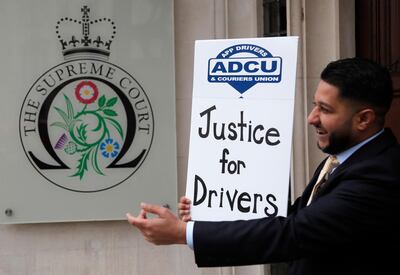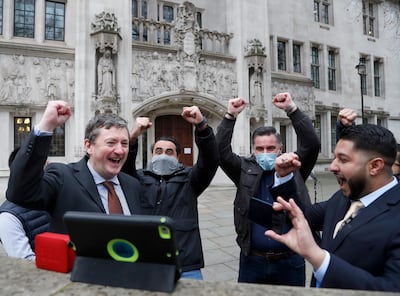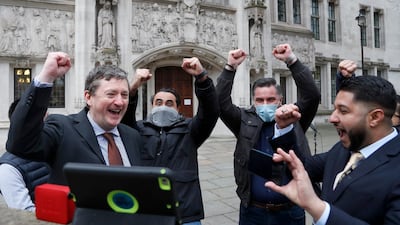Britain's top court ruled against Uber on the employment status of its drivers in a judgment that will have wider implications for the gig economy.
More than 20 drivers took the company to court to argue they were entitled to employee rights such as holiday pay, employer pension contributions and the national minimum wage.
Uber insisted that the drivers are self-employed since they choose their own hours and place of work, and often find passengers through rival apps, but the Supreme Court ruled in favour of the drivers on Friday.
This final ruling means the complainants who launched the case can ask an employment tribunal for compensation as workers. The company said the case assessed the Uber app as it was in 2016 and therefore does not take into account the substantial changes made to the business operations.
The drivers are not entitled to redundancy payments or compensation for unfair dismissal.
The ruling could have an impact across the online platforms behind the gig economy in Britain, for people doing short-term work without formal contracts, or working without guaranteed hours.
"This has been a gruelling four-year legal battle for our members – but it’s ended in a historic win," said the GMB union's national officer Mick Rix.

"The Supreme Court upheld the decision of three previous courts, backing up what GMB has said all along; Uber drivers are workers and entitled to breaks, holiday pay and minimum wage.
“Uber must now stop wasting time and money pursuing lost legal causes and do what’s right by the drivers who prop up its empire.
“GMB will now consult with our Uber driver members over their forthcoming compensation claim.”
Lawyers Leigh Day, fighting the case on behalf of GMB, said tens of thousands of Uber drivers could be entitled to an average of £12,000 ($16,703) each in compensation.
Couriers for the Deliveroo food app are fighting in the Court of Appeal in London for the right to collective bargaining.
Uber says that it has changed the way it works since the legal action began.
Drivers can now choose when and where they drive and can also access free health insurance, as well as compensation for parental leave, it says.
This week Uber vowed to increase protection for drivers while keeping them self-employed.
Uber chief executive Dara Khosrowshahi on Monday presented a series of promises to European governments and trade unions. He said the aim was to offer a transparent and fair pay structure, and more benefits to drivers.
Uber is calling for companies in the sector to form a joint fund that would allow drivers who work for different apps to be able to access protections and benefits, such as paid holidays.
Uber plans to replicate in Europe proposals it first made in California, after a court in the US state ordered the platform to classify its drivers as employees.

Friday's decision is not expected to affect Uber's right to operate in London, which is subject to a separate dispute.
The platform last September regained the right to operate in London for 18 months, after a court overruled a decision by city authorities to suspend its licence after concerns over passenger security.


